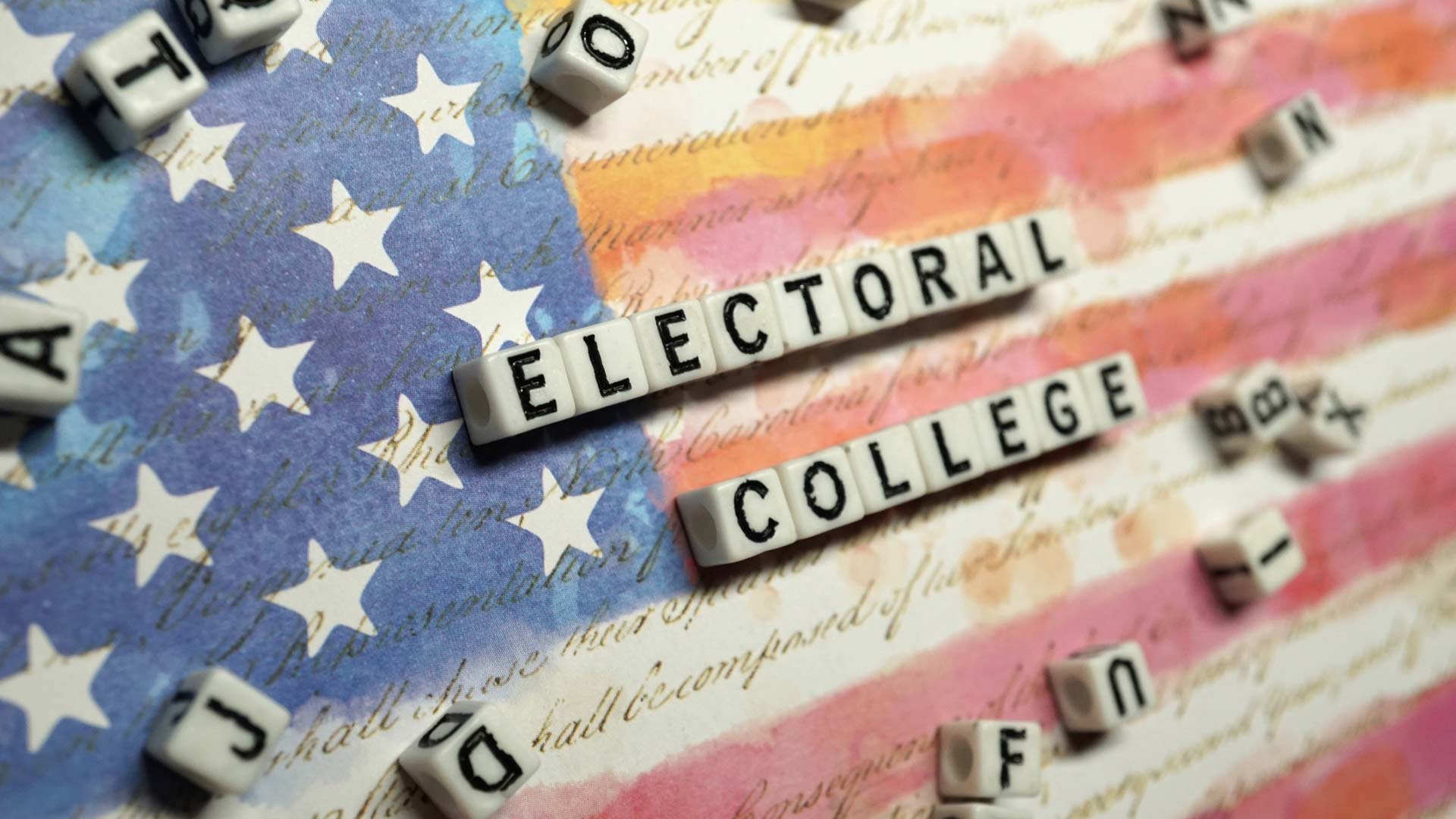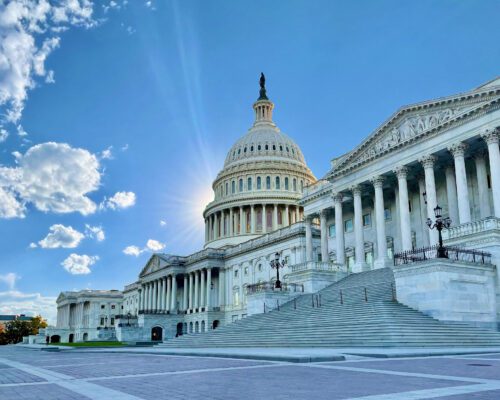On Wednesday, a group of insurrectionists attempted to disrupt the final step of the Electoral College, the counting of the electoral votes by Congress. As Congress reconvened later that night after the Capitol was cleared by law enforcement, the counting was made officially and declared President-elect Joe Biden and Vice-President-elect Kamala Harris the winners of the 2020 presidential election.
Here is what you should know about how the Electoral College process is used to determine the presidential election and why it is an important institution for protecting our republican form of democracy.
What is the Electoral College?
We tend to associate the term “college” with higher education. But in this case, the term refers to a meaning that goes back to the 14th century: an organized association of persons invested with certain powers and rights or engaged in some common duty or pursuit. The Electoral College is thus a process rather than a place. Although the term Electoral College is never used in the Constitution (Article 2, Section 1, Clauses 2 and 3), the electors that choose the president at each election are traditionally called a College.
The Electoral College process consists of the selection of the electors, the meeting of the electors where they vote for president and vice president, and the counting of the electoral votes by Congress.
Where did the Electoral College system come from?
The Electoral College was proposed by James Wilson at the Constitutional Convention as a compromise between those who wanted the Congress to choose the president and those who believed the election should be decided by the state legislatures. The Framers were generally in agreement that giving the people the power to directly elect the president was a terrible idea, but that decision was changed with the 12th Amendment (Amendment XII) to the United States Constitution, which provides the procedure for electing the president and vice president.
Who decides how many electoral votes each state receives?
Each state receives an electoral vote for each U.S. senator (two per state) plus one for each Congressional representative. Since the number of representatives is based on population, the state’s electoral votes are also based on the number of people who reside within a state.
Currently, the Electoral College includes 538 electors, 535 for the total number of congressional members, and three who represent Washington, D.C. (for the purposes of the Electoral College, the District of Columbia is treated like a state).
When U.S. citizens went to the polls on Nov. 3, 2020, they were voting on electors who would cast a vote for their preferred candidate (Donald Trump, Joe Biden, etc.) The voters in each individual state thus chose electors to serve in the Electoral College.
How do these electoral votes decide who becomes president?
On the Monday following the second Wednesday in December (which fell on Dec. 14, 2020 for this year), the electors of each state meet in their respective state capitals to cast the official votes for president and vice president.
The governor for each individual state then verifies the count and issues the Certificates of Ascertainment and the Certificates of Vote. These votes are then sealed and sent to the president of the Senate (the current Vice President, Mike Pence), who will open and read the votes on Jan. 6 in the presence of both houses of Congress. The Certificates from all 50 states and the District of Columbia are opened, presented, and recorded in alphabetical order.
The president of the Senate then announces the results of the vote and calls for any objections. To be recognized, any objections must have been submitted in writing and be signed by at least one member of the House and one senator. If an objection is recognized, the House and Senate withdraw to their respective chambers to consider the merits of any objections, following the process set out in 3 U.S.C. §15. For the objection to be recognized, both chambers must agree to it by a simple majority vote. If they do not both agree, the original electoral votes are counted with no changes.
Even after the insurrectionists attacked the Capitol building, six Republicans in the Senate and 121 Republicans in the House objected to certifying Arizona’s electoral outcome, and seven Senate Republicans and 138 House Republicans objected to certifying Pennsylvania’s electoral outcome. Those objections were overwhelmingly rejected by the other members of Congress.
After all the votes are recorded and counted, the president of the Senate declares which persons, if any, have been elected president and vice president of the United States. Because of the riot, Vice President Mike Pence was not able to formally announce President-elect Joe Biden as the winner until just after 3:40 a.m. on Thursday.
The president-elect and vice president-elect take the Oath of Office and will be sworn into office exactly two weeks later, at noon on Jan. 20.
Who are these electors?
Since the political parties choose electors, they tend to be partisan political activists. The Constitution doesn’t have any requirements other than specifications for who cannot be an elector: a representative or senator, a high-ranking U.S. official in a position of “trust or profit,” or anyone who has “engaged in insurrection or rebellion” against the United States.
Do the electors have to vote for the candidate who received the most votes in their state?
No, the elector is free to cast his vote for anyone he or she chooses. In fact, there have been times when electors have voted contrary to the will of the people—and it’s entirely Constitutional. Anyone who votes against their state’s choice is known as a “faithless elector” and essentially ruins any future they might have had with their political party. In the history of the process, only about 156 faithless electors cast their vote for another person other than the candidate they were expected to choose.)
However, states can pass laws against faithless electors. Currently, 33 states plus the District of Columbia require electors to vote for a pledged candidate, though about half (16 plus DC) do not have any penalty or any mechanism to prevent the deviant vote from counting as cast. Five states have some type of penalty and 14 states provide for the vote to be canceled and the elector replaced. The Supreme Court upheld the legitimacy of such laws in the 1952 case Ray v. Blair, and the 2020 case, Chiafalo v. Washington.
How many electoral votes are needed to win?
A presidential candidate must receive a majority (270 of the 538 eligible) in order to win the election. Joe Biden’s electoral win over Donald Trump was 306-232, the same margin Trump won over Hillary Clinton in 2016.
Could Vice President Pence have rejected the election results?
On Tuesday, Jan. 5—a day before the counting of the electoral votes by Congress—President Trump tweeted, “The Vice President has the power to reject fraudulently chosen electors.”
It’s unclear why the president made this claim since neither the Constitution nor any other federal law give the vice president such authority. The 12th Amendment merely states that, “The President of the Senate shall, in the presence of the Senate and House of Representatives, open all the certificates and the votes shall then be counted.” The other relevant law is the Electoral Control Act of 1887, which also does not mention any role for the vice president in resolving electoral disputes.
Vice President Pence issued a letter saying he recognized the limitations of his role. “It is my considered judgment,” wrote Pence, “that my oath to support and defend the Constitution constrains me from claiming unilateral authority to determine which electoral votes should be counted and which should not.”
Additionally, no state legislature has sought to change their state’s vote counts and no governor has claimed their state’s results were based on fraud or voting irregularities, as Trump has claimed.
Why does the Electoral College matter?
For much of human history, the dominant legal principle was rex lex—“the king is law.” In the 1600s, though, that view was subverted, mostly by Christian thinkers like Samuel Rutherford, who claimed lex rex—“the law is king.” Since then most Western governments have adopted the principle that the rule of law, rather than the arbitrary diktats of government officials, should govern a nation.
For 224 years—since John Adams took office in 1797—there has been a peaceful transition of power between presidents of the United States. That record is due, in no small part, to our reliance on the rule of law as applied to the Electoral College.
While an attempt was made on Wednesday to disrupt and usurp that process, the eventual outcome revealed that the Electoral College remains a robust institution. But it also revealed that Americans—and especially Christians in America—need to be vigilant to protect the rule of law from mob rule.









